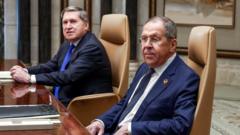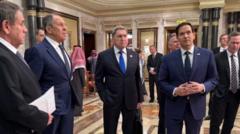The recent release of Salma al-Shehab, a Saudi PhD student, from prison after her sentence was reduced, highlights the complexities surrounding human rights in the kingdom.
**Saudi Arabia Adjusts Sentence for PhD Student Amid Human Rights Concerns**

**Saudi Arabia Adjusts Sentence for PhD Student Amid Human Rights Concerns**
A Saudi student sentenced for online dissent faces a mixed response from activists and authorities.
In a significant development concerning human rights in Saudi Arabia, Salma al-Shehab, a 36-year-old PhD student from the University of Leeds, has reportedly been released after her initial sentence for critical social media activity was reduced. Al-Shehab, who was arrested in 2021 during a holiday in Saudi Arabia, faced severe repercussions for her online posts which advocated for reform and the liberation of activists. Initially sentenced to six years by a terrorism tribunal for "disturbing public order" and "destabilizing the social fabric," her sentence later surged to 34 years before being rolled back first to 27 years and then to four years, with an additional four years suspended.
Human rights activists have highlighted the arbitrary nature of her imprisonment, claiming it reflects a broader trend in Saudi Arabia, where dissenters are often met with harsh penalties. ALQST, a UK-based rights organization, reported on al-Shehab's release, asserting that her long incarceration was unwarranted and based solely on her peaceful expression of views. They emphasize the need for her complete freedom, including travel rights to continue her education at the University of Leeds.
Under the rule of Crown Prince Mohammed bin Salman, the Kingdom has seen increased efforts to suppress dissent. Social critics, including women’s rights activists, have received lengthy prison sentences or worse for speaking out against the government. Al-Shehab has been a vocal supporter of women’s rights, and her case has drawn comparisons to others currently imprisoned for similar reasons, underscoring the ongoing struggle for freedom of expression in Saudi Arabia.
Amnesty International's Middle East researcher, Dana Ahmed, remarked that while al-Shehab's release is cause for celebration, it also sheds light on numerous others who are still unjustly imprisoned for advocating for basic human rights and freedoms in the country.
As the international community observes the evolving situation in Saudi Arabia, her case serves as a reminder of the ongoing challenges faced by activists within the kingdom, provoking calls for broader reforms and true accountability for human rights violations.
Human rights activists have highlighted the arbitrary nature of her imprisonment, claiming it reflects a broader trend in Saudi Arabia, where dissenters are often met with harsh penalties. ALQST, a UK-based rights organization, reported on al-Shehab's release, asserting that her long incarceration was unwarranted and based solely on her peaceful expression of views. They emphasize the need for her complete freedom, including travel rights to continue her education at the University of Leeds.
Under the rule of Crown Prince Mohammed bin Salman, the Kingdom has seen increased efforts to suppress dissent. Social critics, including women’s rights activists, have received lengthy prison sentences or worse for speaking out against the government. Al-Shehab has been a vocal supporter of women’s rights, and her case has drawn comparisons to others currently imprisoned for similar reasons, underscoring the ongoing struggle for freedom of expression in Saudi Arabia.
Amnesty International's Middle East researcher, Dana Ahmed, remarked that while al-Shehab's release is cause for celebration, it also sheds light on numerous others who are still unjustly imprisoned for advocating for basic human rights and freedoms in the country.
As the international community observes the evolving situation in Saudi Arabia, her case serves as a reminder of the ongoing challenges faced by activists within the kingdom, provoking calls for broader reforms and true accountability for human rights violations.



















